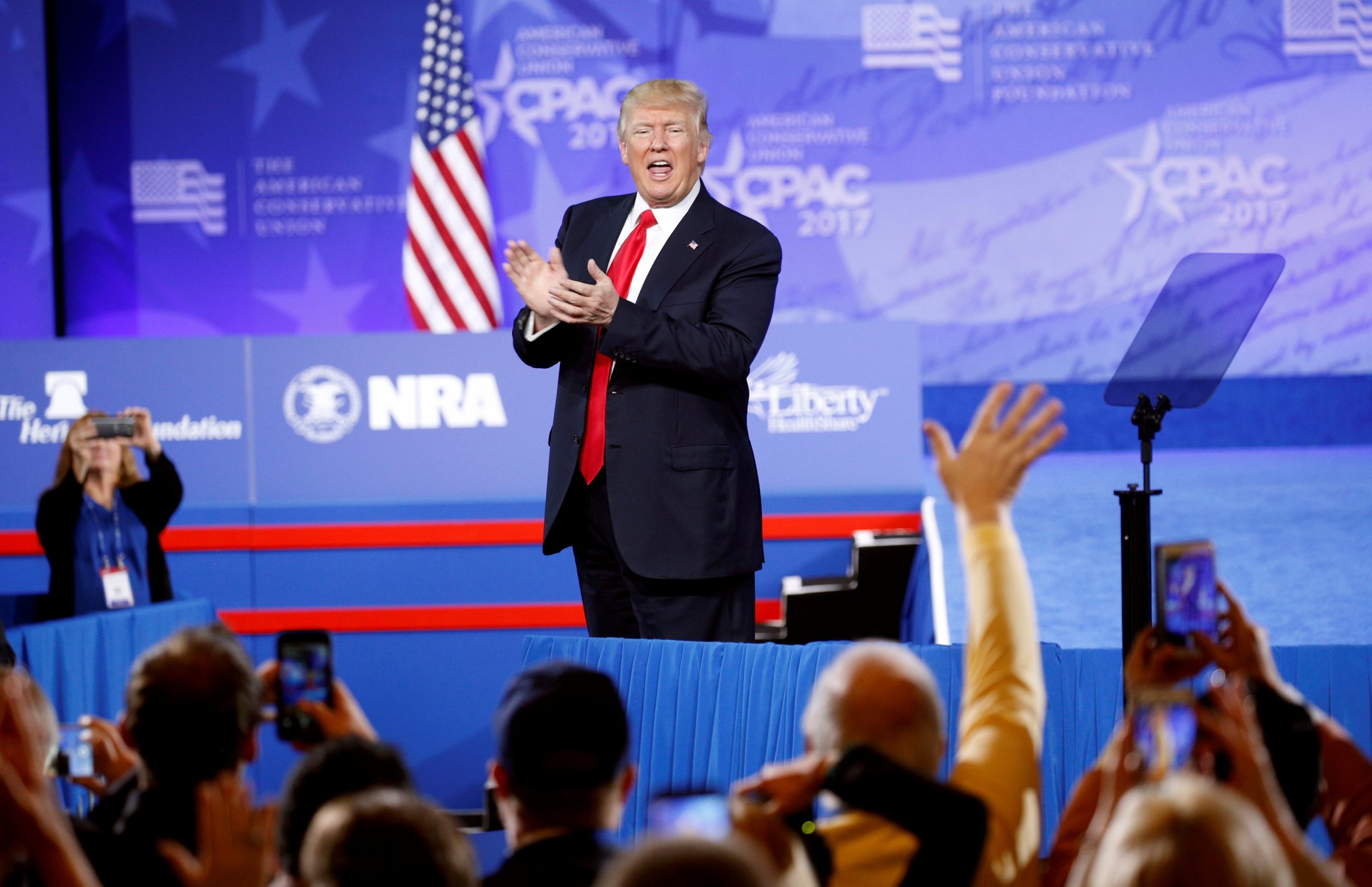
"If Heaven Has a Gate, A Wall and Extreme Vetting, Why Can't America?" That was the name of one of the last panels at the Conservative Political Action Conference before the balloons were popped on Saturday afternoon, "Media Row" broadcasters packed up their makeshift studios, and everyone left the Gaylord National Harbor Resort & Convention Center in Maryland until next year. The title, of course, says it all. The Trump takeover of CPAC is complete, at least for now. Kellyanne Conway joked that CPAC should be called TPAC—for Trump—and she was greeted with laughter and applause for a reason.
RELATED: Behind the scenes at CPAC 2017
When a party takes power, its members try to paper over differences. When I went to CPAC in out years, there was plenty of vitriol for the Democratic president, whether it was Bill Clinton or Barack Obama, but also a robust debate about what went wrong and how to go forward. This year there was much less of that. In 2015, when Laura Ingraham, the broadcaster and Trump supporter, interviewed Chris Christie, the tension was palpable as she portrayed him as a squish and softie on immigration. In other speeches, the endless cavalcade of Republican candidates had offered differing visions of conservatism. There was Jeb Bush's big-hearted belief in more immigration and education reform that included Common Core or Rand Paul's libertarian-inflected Republicanism. During the George W. Bush years, at least at first, differences were muted. But as Bush emerged as a big spender—his expansion of Medicare to include a prescription drug entitlement—conservatives began to openly break with him at CPAC. We're not there with Trump. The enthusiasm for him, the sweep of his ideological shift, the frisson of his surprise victory—all of that means that he goes into his first year in office with extraordinary support from the grassroots that gathers at this Maryland resort even if they were slow to rally to him in the primaries. Now he's their man.
If there were non-Trumpian themes from the mainstage at CPAC, I didn't hear them, and even in the smaller breakout sessions, the differences were modest. A panel on trade was more about the road from here than relitigating the now America-free Trans-Pacific Partnership. John Bolton, George W. Bush's hawkish U.N. ambassador who was hoping to land in the Trump administration, had railed on Vladimir Putin during past CPAC conventions. This year he offered only a quick reassurance to the crowd that Trump had been critical of the arms control agreement that Obama had forged with the Russians in 2010. There was no lengthy, frothy denunciation of Moscow.
If Bolton has been Trumpified, that doesn't leave much room for the rest of the party. It's worth remembering that Reince Priebus, in his capacity as Republican Party chairman, had offered an autopsy after the 2012 election that said wooing Hispanics was the way forward for the party and that needed to be done with friendly outreach and getting immigration reform settled. Well he was right about one part. It is being settled, but on the terms that Steve Bannon, Donald Trump and Jeff Sessions come up with.

There was lots of talk at CPAC about "The Forgotten Man"—a phrase that Franklin Roosevelt used and that Trump has appropriated. (An eponymous book by a Wall Street Journal editorial writer is much touted in GOP circles because it portrayed FDR as the enemy of working folks.) But the forgotten man, presumably a white, working-class voter who felt ignored by both parties, is now center stage. It's axiomatic but true: It's up to Trump and Paul Ryan and Mitch McConnell to start delivering. So far there have been executive orders and a super conservative cabinet. Next week the president will start to put more flesh on his legislative agenda in a speech before Congress. Will there be serious infrastructure spending or was that rhetoric? After years of dissing Obamacare, will Republicans settle on a replacement plan? Whose taxes will be cut? Will we really start "taking care of our vets?" The forgotten man is going to start expecting some answers and results.
The non-economic issues that animate conservatives were on full display here, and Trump will continue to rile up the base with them. Gun rights, antipathy toward what they deem political correctness, a full-throated anger toward "fake news," fear of a mixed bathroom. "Facts, Not Feelings: Snowflakes, Safe Spaces and Trigger Warnings" was one of the last panels. In his wildly cheered address here, Trump kept talking about defending the flag, a faint reference to some protesters in 2016. (Never mind that the sainted Justice Antonin Scalia had been the deciding vote striking down a law banning flag burning.) Those issues will continue to percolate but attention is going to turn to the practical lives of the forgotten man. He made Trump and can break him.
Uncommon Knowledge
Newsweek is committed to challenging conventional wisdom and finding connections in the search for common ground.
Newsweek is committed to challenging conventional wisdom and finding connections in the search for common ground.
About the writer
Matthew Cooper has worked for some of America's most prestigious magazines including Time, The New Republic, National Journal, U.S. News ... Read more
To read how Newsweek uses AI as a newsroom tool, Click here.








